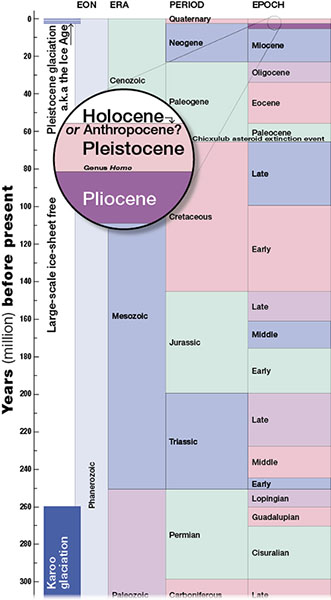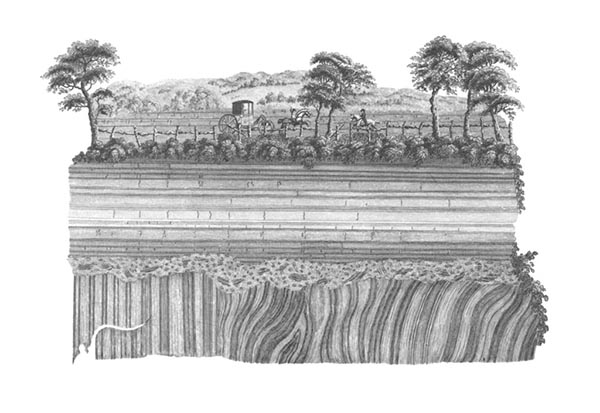I’m Beth. I study people who study earthquakes and people who work to minimize the damage that earthquakes cause.
That’s my short introduction; the line I use with nearly everyone to describe my research. I do fieldwork in the offices, conference rooms, labs, and workshops of earthquake-prone Mexico, where cutting-edge research and technical problem solving is happening (not to mention pitched battles over what “cutting edge research and problem solving” could mean in the first place).
I am the associate editor in charge of earth sciences, laboratory sciences, and environmental anthropology here at the CASTAC Blog, topics that are entangled in important ways for anthropology.
One good example of how these topics have, together, become particularly charged in recent years is that of the “Anthropocene.” This is a term used to designate the period since, alternately, the industrial revolution or the development of the atom bomb, in geological time. Its proponents suggest that this (very recent) period requires renaming because it is humanity, rather than any other force or condition, which has the strongest impact on earth systems today.
The Anthropocene has become a sort of charismatic mega-category that you may have encountered in relation to geology, social theory, potentially policy-oriented work about perilous climate changes and the various countermeasures that could be taken against them, or even in popular accounts of early 21st century anxiety.

Potentially no longer lumped in with everything else in the Holocene. (infographic courtesy of http://www.mahurangi.org.nz)
It may seem a little funny to frame an introduction to a series of posts on earth sciences, laboratory sciences, and environmental anthropology with the Anthropocene. The idea is far from universally accepted, after all, and many of the pieces I’ll be bringing you won’t even touch on it explicitly. I start here, however, because I want to signal the kind of weird hyperobject status that I see the earth taking on, and the implications this could have in anthropological theory and disciplinary practices today, just as it does in my field sites.
The Earth in Theory
Last month I had the pleasure of attending a conference organized by graduate students at McGill University. There we (graduate students and established scholars alike) experimented with the power of attention to the earth itself and to earth-oriented terminology. We found that this orientation opened spaces for us to talk about what it means to live in the framework of history or emotion, within shared projects, with trauma or celebrity.

Both powerful metaphor and fascinating history: 1787 engraving of Hutton’s Unconformity by John Clerk
We thought particularly about the material world and histories, and what we could and couldn’t– and maybe even shouldn’t– express. We read Hugh Raffles’s recent work on rocks. Maria Starzmann, Peter Skafish, and Kregg Heatherington reflected on geology and geological metaphors in their work, and a fabulous keynote from Valerie Olson explored systems thinking about nature and knowledge production.
Though they took on wildly divergent subjects, our projects and ideas hung together. The earth is, after all, a topic we’ve taken to thinking of in terms of its systems that integrate forces, materials, technologies, ideas, lives, and analytic scales.
Many of us– from archeologists to affective theorists– were able to take in a talk by Latour on his experimental inquiry into modes of existence. It’s worth noting that he’s talking about the Anthropocene these days, too.
The Earth and Funding Issues
Many of us are invested in earth and environmental sciences in our research, one way or another. However, these interests don’t emerge in a vacuum in any sense. As anthropologists, we aren’t just treating these topics if and as we choose.
Those of us looking for funding in the US are finding ourselves both emplaced and displaced right now: sought after in interdisciplinary collaborative research projects and less than supported by discipline-specific grants.
At an American Geophysical Union conference last spring, I was told by several earth systems scientists that I had a bright future; that everyone needs someone like me on their grants. I’m not convinced that the kind of research I am currently doing will have outputs that are anything like those that geophysicists are interested in, but I have certainly noticed the wide variety of interdisciplinary grants (like these under the umbrella of the NSF) circulating on many of the listservs I subscribe to. At this moment of potential collaborative plenty, anthropologists are also being marginalized in national research agendas that seem to lay the groundwork to support direct applications to some STEM fields or national security.
The relevance of social science research, especially in light of the charismatically-threatening and politically potent issues that inform discussion about an Anthropocene, is not a hard sell– at least when framed in terms of certain kinds of interdisciplinary discourses and projects. What kind of space that’s actually opening is anybody’s guess.
Earth Science, Lab Science, and Environmental Anthropology on CASTAC
One of the reasons I leapt at the chance to participate in the CASTAC Blog is that I’m excited to get people to talk more about their work and observations in light of highly political interdependencies of field and lab sciences, engineering, sociality, and materiality.
What does focusing on environments and the material world do for anthropology today? What can those of us with particular interests in anthropology of science and technology see in our field and work sites when we’re thinking in these terms, especially in the context of the various looming visions that have given the term Anthropocene such traction?
Over the next few months I’ll be curating blog posts from some people who are doing really thoughtful work. Maybe, when taken together, they will give us some good tools or new perspectives for thinking about what the earth is to the anthropology of science and technology. We have got some great posts lined up, and I’m really excited about them.
Stay tuned!

2 Comments
There is no doubt that megachanges to our environment resulting from the industrial age have begun to show. If it is a new geologic age that we are going through, is “anthropocene” the right word for it?
“Anthropo” implies human both after and before the industrial age doesn’t it?
Really thought-provoking post! I love how you question what doing anthropology looks like when the Earth itself is pushing back—and what it means when ‘humans’ are no longer just one actor among many, but a geological force. Thanks for pushing us to rethink not just our methods and vocabularies, but our responsibilities too.
5 Trackbacks